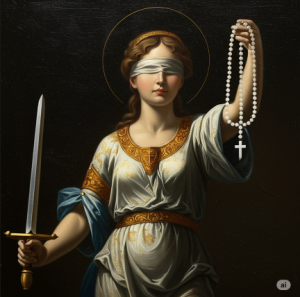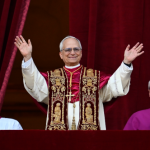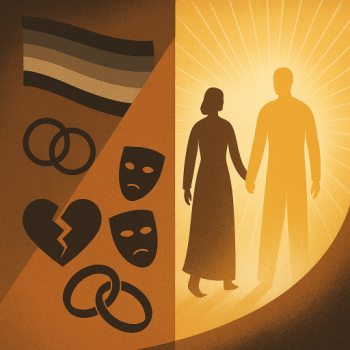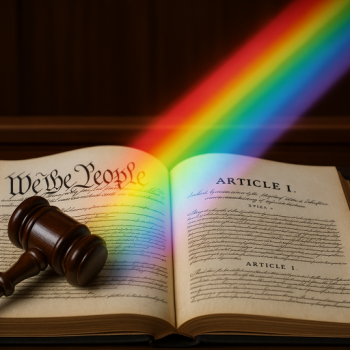
When Patheos initially asked me to contribute to its current discussion on religion and political authority, I jumped at the chance. As a Catholic conservative, I often write about current political and cultural issues through the eyes of a faithful son of the Catholic Church. However, as I began researching what my Church teaches about political authority, I started having second thoughts.
You see, the Catholic Church stands as one of the oldest and most influential institutions in the world. Our late pope, Pope Francis, was the 266th man to hold the office of Bishop of Rome and successor to the Apostle Peter.
How many current institutions can claim leaders who once stared down Attila the Hun (St. Pope Leo the Great, d. 461 A.D.) and helped end Communism in Eastern Europe (St. Pope John Paul II, d. 2005 A.D.)? Given the Church’s profound intellectual tradition and its endurance through all geopolitical changes of the past two millennia, I needed to narrow my focus. Therefore, for this article, I will limit myself to more recent history—say, the past five hundred years.
Here, I will discuss the Church’s views on legitimate government authority, natural law and rights, civil participation, and the proper and common good. Towards that end, I aim to demonstrate the following:
- Governing authority comes from God (Romans 13) and exists to promote the proper and common good.
- Humans receive their natural rights from God, not from the whims of governments.
- All Catholic citizens must exercise responsible civil participation and work toward the proper and common good.
Church Documents
The primary Church documents referenced in this article include:
– Gaudium et Spes (December 7, 1965)
– Compendium of the Social Doctrine of the Church (2004) – Pontifical Council for Justice and Peace
– Conscience for Faithful Citizenship (2007) – USCCB
– Forming Consciences for Faithful Citizenship (2024) – USCCB
– Catechism of the Catholic Church (October 11, 1992)
Authority Comes from God
Foundationally, the Catholic Church teaches that all governing authority comes from God. In Romans 13, St. Paul affirms that “there is no authority except from God, and those that exist have been instituted by God.” He urges Christians to live as good citizens, give honor to governing authorities, and pay taxes, since God has placed those authorities to maintain order and promote the proper and common good.
However, St. Paul assumes that legitimate authority acts as “God’s servant” and works for the good. His teaching does not endorse tyranny. Regarding resistance to political regimes, CCC 2243 allows for such action if “certain, grave, and prolonged violation of fundamental rights” exists, among other extreme conditions. The Compendium of the Social Doctrine of the Church (CSDC), quoting St. Thomas Aquinas in paragraph 398, explains:
Authority must enact just laws—that is, laws that correspond to the dignity of the human person and to what is required by right reason. “Human law is law insofar as it corresponds to right reason and therefore is derived from the eternal law. When, however, a law is contrary to reason, it is called an unjust law; in such a case, it ceases to be law and becomes instead an act of violence.”
Therefore, governing authority is legitimate only when it exercises power in accordance with right reason and eternal law—not as tyranny.
Natural Law and Human Rights
The ultimate source of human rights is not found in the mere will of human beings, in the reality of the State, or in public powers, but in man himself and in God his Creator.” — Compendium of the Social Doctrine of the Church, 153
The influence of the Catholic Church on the modern understanding of human rights is too broad to fully address here. However, natural law theory, developed by thinkers like Aristotle and St. Thomas Aquinas, shaped Enlightenment figures such as John Locke and Thomas Jefferson, who in turn influenced modern constitutional republics.
For our purposes, the essential point is this: human rights begin and end with God. Made in His image, human beings possess inherent dignity and certain unalienable rights—such as the rights to life, liberty, and the pursuit of the good. Because these rights originate in God, governments cannot revoke them arbitrarily. God also makes these rights accessible to all people through human reason.
Correctly understanding life, liberty, and the good is essential for any faithful Catholic exercising their civil responsibilities.
Responsible Citizenship and the Proper Good
The Church, for her part, founded on the love of the Redeemer, contributes toward the reign of justice and charity within the borders of a nation and between nations. By preaching the truths of the Gospel and bringing to bear on all fields of human endeavor the light of her doctrine and of a Christian witness, she respects and fosters the political freedom and responsibility of citizens. — Gaudium et Spes, 75
In the Catholic tradition, responsible citizenship is a virtue, and participation in political life is a moral obligation. — USCCB Consciences for Faithful Citizenship, 13
The Church teaches that faithful Catholics have a moral duty to participate in the civil life of their respective countries. How an individual fulfills that obligation depends largely on how they define key terms like life, liberty, and good.
- Does a Catholic place limits on what constitutes life?
- Do they view liberty as freedom without responsibility?
- Do they see conflict between the common good and the proper good?
In modern societies, these definitions often diverge from Catholic teaching. Secular voices may pit the proper good against the common good, branding it as “oppressive religion” or “Christian nationalism.” To address this challenge, the United States Conference of Catholic Bishops released Forming Consciences for Faithful Citizenship (2024), which acknowledges the complexity of modern political choices.
Moreover, the document urges Catholics to discern “the proper relationship among moral goods” when forming their consciences. It also outlines non-negotiables that no faithful Catholic can support, including abortion, euthanasia, assisted suicide, poor working and living conditions, redefining marriage (i.e., same-sex marriage), and racism.
Catholics who vote for candidates or policies that support these evils formally cooperate in grave moral wrongdoing.
Final Thoughts
To return to the original writing prompt: the Catholic Church has much to say about religion and politics. It teaches that governing authorities come from God and exist to promote the proper and common good. However, when such authorities act tyrannically, they forfeit their legitimacy. Human rights come from God, not governments, and the Church places a moral obligation on Catholics to form their consciences properly, discern among moral goods, and resist intrinsic evils such as abortion and euthanasia.
Fortunately, the Church offers a rich body of teaching—developed over nearly two thousand years—to guide faithful Catholics through the moral complexities of political life.
Thank you!
If you liked this article, please leave your comments below. I am very interested in your opinion on this topic.
Read The Latin Right’s other writing here.
Please visit my Facebook page and IM your questions (and follow my page) or topics for articles you would like covered.
Also, please subscribe my YouTube page for updates on upcoming articles.













